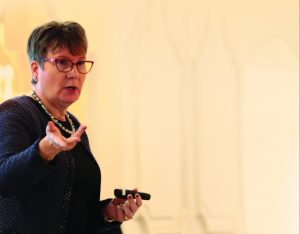Public health outreach necessarily involves a fair amount of counseling and advising, but that doesn’t mean the practitioner’s advice is being taken.
[pullquote direction=”right”]“Unless someone like you cares a lot, nothing is going to get better, it’s not.” —Dr. Seuss, The Lorax[/pullquote]
Public health outreach necessarily involves a fair amount of counseling and advising, but that doesn’t mean the practitioner’s advice is being taken. That dilemma, and one way of going about solving it, was the subject of a talk given by Dianne Morrison-Beedy, PhD, RN, at the 14th annual Buckley Scholars’ Lecture and Luncheon.
“We do an awful lot of telling in nursing,” said Dr. Morrison-Beedy, chief talent and global strategy officer and centennia professor of nursing at the Ohio State University College of Nursing, who received a round of knowing laughs from the assemblage of healthcare practitioners at The Garden City Hotel on March 27, 2019. “We gave them information about prevention, they understood it, so I’m sure it’ll work.”
Dr. Morrison-Beedy first became aware of that division between thought and action, she said, when she was working as a licensed practical nurse or LPN. Her young patients were coming back to her requesting pregnancy and sexually transmitted infection tests. “I must not be doing that great a job, because I know I told them to use a condom,” she recalled thinking at the time.

The experience led her to pursue her doctorate and to devote her work to understanding how to better ensure that the information nurses pass on is taken to heart.
Her talk, titled “Risk Reduction: Developing and Moving an Evidence-Based Intervention in Practice,” outlined her work as she came to understand and put into practice better ways of making sure people don’t just know, but that they do.
People make decisions about sexual health that can “throw off the est of your life,” she noted. “There are reasons why people do certain behaviors even if they know health-wise they shouldn’t.”
The risk of contracting HIV is the most dramatic, if not the most common, example. Dr. Morrison-Beedy said that exposure to the virus generally occurs 10 years prior to a positive test result.
If women are testing positive in their 20s or early 30s, then they are being exposed to the virus at a much younger age than we might sometimes assume, and education efforts need to be directed toward that population.
“We have to move earlier,” she said. “We have to think about adolescent girls.”
Her work has resulted in her founding her own organization, HIP4Change, to provide community organizations and agencies with evidence-based, theoretically driven risk-reduction interventions. The agency aims to provide organizations with tested means of gathering information and targeting at-risk populations. The organization is now working with agencies in seven states and is in talks with three countries to implement and expand its practice of, in her words, “evidence-based intervention.”
Dr. Morrison-Beedy closed the talk with a quote from Dr. Seuss’s beloved fable of social change, The Lorax: “Unless someone like you cares a whole lot, nothing is going to get better, it’s not.”
For further information, please contact:
Todd Wilson
Strategic Communications Director
p – 516.237.8634
e – twilson@adelphi.edu